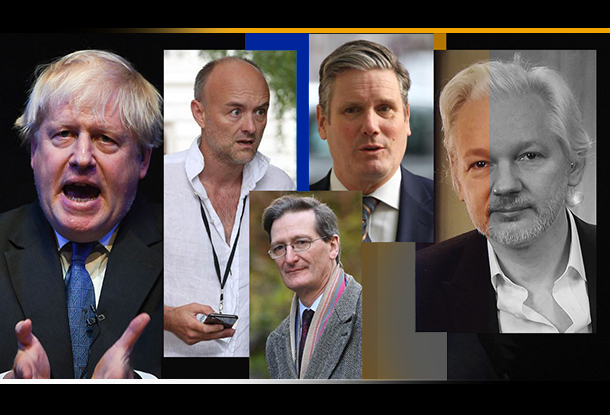
Nina Cross
21st Century Wire
On Monday evening MPs voted to force the UK government to publish all of its no-deal Brexit ‘Yellowhammer‘ documents. A majority vote of 311 to 302 was passed in favour of what is known as a “humble address” to force the government to publish all the Yellowhammer documents available to the cabinet or a cabinet committee since 23rd July, the date Boris Johnson was appointed as Prime Minister.
The motion was brought by Tory MP and former cabinet attorney general, Dominic Grieve. In effect, this demanded that the government publish its assessment to show the ‘baseline scenario’ of what would happen if the UK leaves the EU without a deal. On Wednesday evening, the government published the Yellowhammer document described as ‘not a formal cabinet paper’.
In addition to demanding the publication of Yellowhammer, Grieve’s humble address motion demanded the publication of all documents relating to the government’s decision to dissolve parliament, otherwise known as “prorogation,” from 10th September to 14th October. Historically speaking, prorogation is a relatively standard government procedure, but the dates for prorogation this year became the subject of a legal battle as MPs accused the government of plotting to shut down parliament in order to avoid scrutiny should it attempt to prepare for a ‘No Deal’ Brexit. The UK Supreme Court is expected to rule on the lawfulness of Johnson’s motive for prorogation next week.
The Prorogation documents demanded in Grieve’s humble address include the following:
“…all correspondence and other communications (whether formal or informal, in both written and electronic form, including but not limited to messaging services including WhatsApp, Telegram, Signal, Facebook messenger, private email accounts both encrypted and unencrypted, text messaging and iMessage and the use of both official and personal mobile phones) to, from or within the present administration, since 23 July 2019 relating to the prorogation of Parliament sent or received by one or more of the following individuals: Hugh Bennett, Simon Burton, Dominic Cummings, Nikki da Costa, Tom Irven, Sir Roy Stone, Christopher James, Lee Cain and Beatrice Timpson…”
It was Grieve’s view that communications involving the named government advisors, might provide proof that Johnson’s decision to shut down Parliament was a tactic to stop debate in the House of Commons before the Brexit deadline of October 31. Such proof would allow him to demonstrate that Johnson had misled the Queen, who endorsed his decision, so it is believed, on the understanding that a shut down of parliament was in order to introduce a new domestic legislative agenda.
The reaction from government Ministers was to reject the MPs’ demands for all documents and internal communications.

Dominic Grieve
Grieve’s humble address seems to suggest that the British government (Parliament in this case) maintains such an arbitrary approach to information disclosure. It would seem to be the case that when the status quo is challenged, whether it is through a mischievous leak such as the one around the British ambassador Kim Darroch, or the shattering leaks of truth tellers such as those published by Julian Assange, founder of Wikileaks – the political class is poised to crush such publications. On the other hand, we see its eagerness to grab and disseminate at any sources that might bring down elements of its own that seem to have gone rogue. Similar issues about sensitive disclosures and internal government investigations arose the wake of the Huawei Leaks.
RELATED: Official Secrets: Priti Patel’s Early War on Whistleblowers
The outrage over the Darroch leaks led to a parliamentary debate, an opportunistic Foreign Affairs select committee inquiry driving harsher punishments and the launching of an investigation by the Metropolitan Police with threats directed towards the press against publishing diplomatic leaks – under what seemed to be the expanding remit of the Official Secrets Act. Such was the outcry that the contents of a civil servant’s correspondence might be disclosed. The overwhelming principle presented to the public by politicians was that public and civil servants’ space to write what they think should be protected and defended, and this seemed to achieve wide-spread endorsement in parliament, including from Grieve. It should be pointed out that although Grieve’s list comprises names of political advisors, he had originally placed many high level civil servants on it, and had removed them only so that his effort did not look like a fishing expedition, as he explained on Monday.
Darroch’s resignation following the leaks led to panic and outrage, which was then closely followed by condemnation of anyone not criticising Trump and defending the civil service, an accusation lobbed at Johnson. Politicians lined up to defend the private space of government servants, some of whom, such as the following, have now supported the move to force advisors to submit their personal and private social media messages for scrutiny:
This kind of behaviour is unworthy of the special relationship and makes it all the more important that Sir Kim Darroch is given our full support and remains in his post as our Ambassador to the United States.
— Hilary Benn (@hilarybennmp) July 9, 2019
Really ominous that Sir Kim Darroch has been forced to resign by a malicious leak, Trump's thin-skinned tantrum and Boris Johnson’s self-interested failure to stand up for our own side. This has created a dangerous precedent for the UK https://t.co/1zCBreyo7D
— Caroline Lucas (@CarolineLucas) July 10, 2019
It should be noted that demanding employees hand over personal and private devices could be challenged in court, a point made by the Tory MP and current attorney general, Geoffrey Cox:
“I have been listening with great care to my right hon. and learned Friend’s observations and part of his draft Humble Address troubles me. What legal right do the Government have to require their employees to give up private email accounts and personal mobile numbers? If there is no legal right—I imagine he would contend that there is not—how on earth would the Government enforce the Humble Address if they desired to do so?
This Humble Address has no binding legal effect on individuals. It potentially has a binding effect on the Government, if they observe it, but not on individuals. There seems to be a risk that it will trespass upon the fundamental rights of individuals, as it is currently drafted”
If this is the case, it can be viewed with some irony that this address was passed on the same night that Jeremy Corbyn also passed a humble address to force Johnson to say he would abide by the rule of law (amid suggestions he might try to get around new legislation mandating him to request a three-month delay to Brexit if there is no deal by 19 October).
One question arising from this might be: how can lawmakers who claim to have such passion in the law that they pass a motion to force adherence to it, also vote for a motion that might not be legal, when this is pointed out to them?
An attempt at justifying this was made during the debate by Labour MP Kevin Brannon:
“Is it a point of order or a point of information to point out that the Prime Minister’s special adviser, Dominic Cummings, asked to examine the private text messages on the telephone of a Government employee?”
As if the apparent unacceptable behaviour of one individual justifies the potential breaching of rights of the individual by parliament?
It should be remembered that Grieve was the attorney general when Julian Assange was being hunted by the British and Swedish prosecuting services. Regarding the decision by the UN Working Group on Arbitrary Detention (UNGWAD) that Assange was being arbitrarily detained in the Ecuadorian embassy in London, Grieve commented:
“...the suggestion that he has been the subject of arbitrariness seemed to be very far fetched.”
“What it effectively says in relation to the United Kingdom is that we ought no longer to be extraditing Mr Assange to Sweden because in 2014 we changed our own laws under the anti-social behaviour, crime and policing act to change some of rules on which extradition should take place, and you’ll appreciate … it doesn’t apply retrospectively.”
What Grieve fails to mention is that the law was changed because European arrest warrants were being issued abusively. Assange’s legal challenge exposed British judges jumping through hoops to legitimise his abusive arrest warrant. Not making changes to the law retrospective – when Assange’s case was clearly covered by the changes – made no sense other than to ensure Assange could not walk out of the Ecuadorian embassy without being arrested.
Here we can see Grieve’s own arbitrary approach to the issue, that potential infringements of rights is a small sacrifice if order is to be established:
“If I may say so, picking up on the earlier point that he made, I was just a little bit surprised. Of course he may argue that the Government cannot get this information, but No. 10 Downing Street is saying is that it will not even seek or try to provide it. This again is absolutely illustrative of the slide we are experiencing towards a Government that will not respect the conventions, without which orderly government in this country cannot take place.”
We should remember the type of justice Grieve defends; the one he offered Assange in 2016 – when he suggested that if he left the embassy he:
“…would have the full protection of our English legal system …”

Keir Starmer
Another ‘man of law’ backing the inspection of personal communication was Labour Shadow Brexit Minister Keir Starmer, former head of the Crown Prosecution Services (CPS). Freedom of information requests made by the Italian news outlet La Repubblica, have revealed that at the time Starmer was director, the CPS worked closely with the Swedish Prosecution Authority (SPA) and that certain CPS emails were in fact deleted. The result was at the very least the partial erasure of the trail of evidence showing why Swedish prosecutors hung the arrest warrant over Assange for so many years but failed to interview him, a factor leading to the UNGWAD decision of arbitrary detention.
On Monday night Starmer commented:
“I am sad to say that it is the basic lack of trust that now exists between this House and the Executive.”
Where the political class is concerned, trust, disclosure and transparency would appear to be heavily linked to usefulness. Neither of the legal big wigs appear concerned for the legalities around acquiring private data from personal devices; do they think we will be blinded by the drama of Brexit and scheming by right-wing individuals that we might waive civil rights and legal protections? What is to stop a repeat of their potentially precedent-setting move that could be imposed more widely next time, in the name of ‘order,’ or directed at a popular dissenting leader on the receiving end of allegations?
How is it that political leaders, heads of the UK’s legal system, can appear to dismiss such concerns when their narratives are grounded in law and order? We have seen how the long road to Belmarsh prison is paved with the same rhetoric.
The response from government to the Grieve address is here.
***
Author Nina Cross is an independent writer and researcher, and contributor to 21WIRE. To see more of her work, visit Nina’s archive.
READ MORE ASSANGE NEWS AT: 21st Century Wire Assange/Wikileaks Files
SUPPORT OUR MEDIA PLATFORM – BECOME A MEMBER @21WIRE.TV















